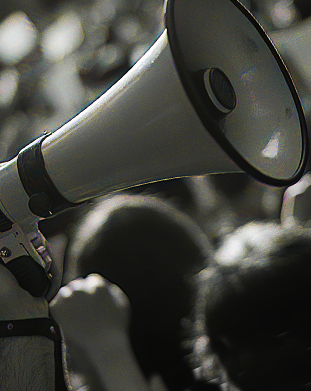Free Speech and Expression
Freedom of speech is core to Cascadia's educational commitment. We observe and promote an individual's rights to share opinions and ideas without interference or retaliation. We hope that members of our community choose to respect our values of diversity and inclusion.

Letter From the President
September, 2024
As we begin fall quarter, I feel compelled to weigh in on the topic of free speech and expressive activities. Cascadia fully supports the First Amendment which grants the right of individuals to exercise free speech. At the same time, as a state institution, we have important responsibilities to preserve.
In the months to come, this subject will be a focus for both employees and students as we work together to support individual expression and our educational mission.
This page outlines our policies and guidelines to help make sure we share the same understanding of what it means to peacefully assemble and exercise free speech at Cascadia. It also offers resources to foster additional learning or seek support. I encourage you to familiarize yourself with the policies and make use of the resources available to you.
Respectfully,

Dr. Eric W. Murray
President, Cascadia College
Policies & Procedures
First Amendment
- First Amendment
- Protects our rights to free speech, expression, press, and assembly, and the right to petition the government.
- Types of speech not protected by the First Amendment include incitement to imminent lawless action, "true" threats, harassment, defamation, and obscenity.
- Hate speech does not have a legal definition under the law but essentially refers to any speech that may denigrate or vilify an individual or group who belongs to or identifies with (or is perceived to belong or identify) a race, ethnicity, gender, sex, sexual orientation, ability, religion, or other protected status. In the U.S. hate speech receives substantial protection under the First Amendment.
Cascadia Policies
The content below highlights excerpts of policies and therefore is incomplete. Please use the links to read the policies in full.
- Use of College Facilities for Expressive Activities Facilities
- WAC 132-142
- Allows colleges to establish rules governing reasonable time, place, and manner for protests. At Cascadia, protests can occur between the hours of 8:00am - 10:00pm; must not block traffic, egress to buildings, or take place inside college buildings; must not disrupt of interfere with classes or college business; must not involve sound amplification; and must not damage property.
- Cascadia requests advance notice of planned protests.
- Freedom of Inquiry and Expression
- WAC 132Z-11-20
- Outlines college support for free speech and the sponsorship of event, speakers, exhibition, entertainers, etc.
- Student Code of Conduct
- WAC 132Z-115-070
- Materials Posting
- Cascadia only permits posting of materials used to promote events or information sponsored by student organizations, classes, and departments as sanctioned by the college and/or University of Washington Bothell.
- All postings need to identify the sponsoring group along with contact information.
- All postings must include the college's non-discrimination statement.
- Social Media
- Social media platforms are considered "private entities" and are not bound by the First Amendment. Colleges can establish their own rules for moderating content. Please familiarize yourself the rules guiding the management of Cascadia's social media.
- Harassment, "true" threats, incitement of violence and other speech not protected by the First Amendment are also disallowed on social media. Public education institutions cannot punish students' protected speech on social media, even if deemed offensive.
Student Rights and Violations
Students' free speech is protected on campus and in classrooms, and are subject the rules and regulations above. Violations should be reported to studentconduct@cascadia.edu. A reported violation will be analyzed as follows:
- Is it considered protected speech?
- Does it violate the Student Code of Conduct (WAC 132Z-115-025)?
- What is the opinion of the Assistant Attorney General?
- If a violation occurred, the college will assign the appropriate sanction as outline in WAS 132Z-115-035
- If no violation occurred, the college will review campus values and students' rights and responsibilities with the student
Employee Rights and Violations
- Academic freedom generally protects classroom speech that is germane to the subject matter, even though such speech may be offensive to some.
- Interests of the employee as a citizen must be balanced against the interest of the college as a state employer, in promoting the efficiency of the public services it performs through its employees.
- Violations should be reported to humanresourcesandpayroll@cascadia.edu
- Employees will be assessed according to a four-step inquiry.
Resources
Informational
- Fostering Civil Discourse (Facing History)
- Navigating Difficult Moments (Derek Bok Center for Teaching and Learning at Harvard University)
- PEN America
- Stop Talking Indigenous Ways of Teaching and Learning and Difficult Dialogues in Higher Education (Oregon State University)